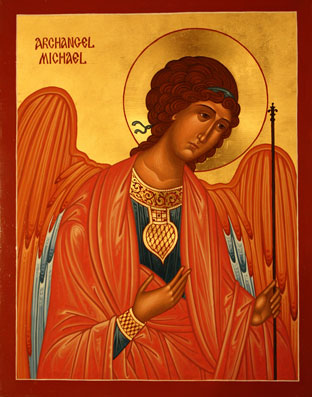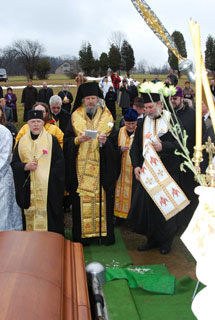A 40th Day Tribute: Archbishop Job of Chicago and the Midwest
Tuesday, January 26, 2010, marks the 40th day memorial of the repose of His Eminence, Archbishop Job of Chicago and the Midwest, who unexpectedly fell asleep in the Lord on Friday, December 18, 2009.

At Chicago’s Holy Trinity Cathedral, where Archbishop Job served since his enthronement as Bishop of Chicago in 1993, a Panikhida will be celebrated on Tuesday January 26 at 7:00 p.m., according to Archpriest John Adamcio, dean. In a communique issued by Archpriest John Zdinak, chancellor of the Midwest Diocese, all diocesan parishes had been asked to celebrate services in the Archbishop’s memory on that day or during the following weekend.
Clergy of the Altoona-Johnstown Deanery will celebrate a Panikhida at Saint John the Baptist Church, Black Lick, PA, where Archbishop Job was laid to rest, on Tuesday, January 26, at 10:00 a.m. A Panikhida also will be celebrated the following evening at 7:00 p.m. On Sunday, January 31, the Divine Liturgy, followed by a Panikhida and memorial repast, will be celebrated at 10:00 a.m.
At Holy Trinity Cathedral, Boston, where Archbishop Job served during his tenure as Bishop of New England, a Panikhida will be celebrated on Thursday, January 28, at 6:30 p.m. Archpriest Robert Arida, dean, extended an open invitation to area faithful to attend the service and the repast that will follow.
“A shock to all.”
“Archbishop Job’s unexpected repose came as a shock to everyone,” said Father John Zdinak, who had spoken with the Archbishop as he was driving from Cleveland to Chicago, two hours before his death. “If I were to characterize him, I would have to say that, regardless of the circumstances in which he found himself, his intense love for the Church and the People of God was unquestionable.”
His Beatitude, Metropolitan Jonah, together with members of the Holy Synod of Bishops of the Orthodox Church in America and hierarchs from Greek, ROCOR, Antiochian, Ukrainian, Serbian, and Romanian Churches, concelebrated funeral services and the Divine Liturgy at Holy Trinity Cathedral, Chicago, December 22-23, 2009. His Grace, Bishop Melchisedek of Pittsburgh and Western Pennsylvania, presided at additional services and interment at Saint John the Baptist Church, Black Lick, PA on Saturday, December 26.

Biography.
Born Richard John Osacky in Chicago on March 18, 1946, Archbishop Job entered Saint Tikhon Seminary, South Canaan, PA, after completing studies at Northern Illinois University, DeKalb, IL. After his seminary graduation in 1970, he served as cantor and youth director at Saint John the Baptist Church, Black Lick, PA. Since the parish was without the ministry of a resident pastor at that time, he conducted services in the prescribed manner for readers and organized religious education classes. He also established a thriving Orthodox Christian Fellowship for students at Indiana University of Pennsylvania. His extraordinary affinity with Orthodox youths and young adults was widely recognized by the Church at large throughout his entire life.
Prior to his ordination to the holy diaconate and priesthood by His Grace, Bishop [later Metropolitan] Theodosius of Pittsburgh, he visited monastic communities on Mount Athos, Greece, which made a major impact on his life. After his assignment as rector of Saint John Church, he continued to serve as spiritual director for the Orthodox Christian Fellowship. He also continued to pursue his lifelong vocation as an iconographer, completing the icons that grace the iconostasis at Saint John Church. He was instrumental in the design and building of the parish’s new church in the early 1980s. His icons may be found in a number of other churches, at Saint Tikhon’s Monastery and Seminary, and in many private homes.
In addition to his iconographic pursuits, he became widely known in the field of liturgical music. He was specifically interested in the Carpatho-Rusyn plain chant—“prostopinije”—indigenous to the region of central Europe from which his ancestors hailed. Among his many arrangements in the English language is the widely sung “A New Commandment I Give to You,” based on the text of John 13:34ff. Most recently, he arranged the Paraklesis to the Mother of God in plain chant. [The arrangement, recorded by a male chorus which he directed in fall 2009, will be made available on CD in the near future.]
Ordained as a celibate priest, he maintained a zeal for the monastic life in all his endeavors. In 1975, he was made a riasaphor monk; seven years later, he was tonsured to the Lesser Schema by His Grace, Bishop [later Metropolitan] Herman. In November of the same year, he was elevated to the rank of archimandrite.
Recognizing the deep love and zeal for the life of the Church on every level that characterized his ministry, he was nominated by the Diocese of New England to fill the diocese’s vacant episcopal see. The Holy Synod of Bishops of the Orthodox Church in America ratified the nomination and elected him Bishop of Hartford and the Diocese of New England. He was consecrated to the episcopacy on January 29, 1983, at All Saints Church, Hartford, CT.
While ministering in New England, he emphasized the importance of religious education, stewardship, lay ministry, and outreach to youth and college students of all ages. One of the most important ministries he initiated was the diocesan youth rally that attracted hundreds of children, teenagers, and young adults every summer.
At its session of November 5, 1992, the Holy Synod of Bishops elected Bishop Job to fill the vacant episcopal see of Chicago and the Midwest. On February 6, 1993, he was enthroned as Bishop of his native city at Holy Trinity Cathedral, Chicago, IL.
Under his guidance, the Diocese of the Midwest experienced tremendous growth. Over 15 new missions and parishes were established during his episcopate. In an effort to “turn around” parishes experiencing decline, a diocesan-wide parish health ministry was initiated. His concern for children and youth continued as he participated in summer camps, youth retreats, and outings throughout the geographically immense diocese. During the 1990s, he attended several international Orthodox summer youth camps in central and eastern Europe. While he had little time to pursue iconography, he continued to enjoy his excellent reputation as an iconographer and iconologist, and was often called upon to lecture on this subject.
He also initiated annual clergy convocations and, as he had done in New England, he initiated a Council of Presbyters, in line with the vision of Saint Ignatius of Antioch.
In recognition of his 20-plus years of “good and faithful” service to the Church, the Holy Synod of Bishops elevated him to the rank of archbishop at its March 2004 session.

In recent years, Archbishop Job expressed intense concern for the spiritual, financial, and administrative crises that had beset the Orthodox Church in America, while displaying his willingness to do whatever he could to restore trust, transparency, and integrity to the Church on all levels.
Several weeks before his repose, he had informally shared his hope to retire in 2011 during the Midwest Diocese’s annual assembly, and had blessed the initiation of the process by which a new diocesan hierarch might be nominated.
Archbishop Job’s iconography.
In early January 2010, a notice appeared on the OCA web site requesting those in a position to do so to submit photographs of Archbishop Job’s iconography for the purpose of creating a gallery. The response to the request has been somewhat slow, in part due to the fact that many of his icons are found in private homes and have never been available publicly. This is complicated by the fact that, while he produced many icons between the mid-1960s and early 1980s, he had little time to pursue his vocation as an iconographer in recent years, given his episcopal responsibilities.
One item that surfaced was an excellent, unpublished monograph by Archbishop Job on iconography—the text of a lecture he had presented in the mid-1980s at a conference on iconography and iconology. The complete text will appear, together with the gallery of Archbishop Job’s icons, in the Winter issue of The Orthodox Church magazine, slated to appear on the OCA web site in early February 2010.
Additional examples of Archbishop Job’s iconography are still being sought. Those possessing examples are asked to send them as attachments directly to .(JavaScript must be enabled to view this email address) no later than February 1, 2010.
In Memoriam: The Quest to Perfect Love
At the very beginning of the second century, Saint Ignatius of Antioch noted that the primary and distinctive task of a bishop is to celebrate the Eucharist, “the medicine of immortality,” presiding “after the likeness of God, and the presbyters after the likeness of the council of the Apostles, with the deacons also, who are most dear to me, having been entrusted with the diaconate of Jesus Christ” [Magnesians 6:1]. These words come to life at the celebration of the hierarchical Divine Liturgy. The bishop stands in the midst of the Church, the People of God—not apart from them, and certainly not above them, but clearly surrounded by them—as the bloodless sacrifice is offered. And implicit in this “arrangement” is the centrality of the episcopal office that, beyond liturgizing, involves teaching, preaching, and healing the People of God—in a word, loving the very flock entrusted to the bishop’s pastoral care.

In recent weeks, the life, ministry, and person of the late Archbishop Job of Chicago have been remembered in countless prayers and liturgical celebrations, in sermons and eulogies and articles, in private conversations and reflections, on blogs and internet forums, and even on Facebook and YouTube! Some spoke of his early years as a seminarian, reader, and pastor in Black Lick, PA; his talents as an iconographer and a liturgical musician; his devotion to the youths and college students whose lives he touched; or his willingness to make himself available to others, regardless of age or position. Others recalled his pastoral gifts—comforting, counseling, listening, and the offering of his time and even treasures in his desire to open the eyes of others to the Kingdom yet to be fully revealed, although already fully present in the life of the Church. Many others reflected on the firm positions he championed in the quest for truth, accountability, and integrity as the Church endured the most difficult spiritual, financial, and administrative crisis it had faced in nearly a century.
Personal memories, naturally, will vary, depending on an endless array of circumstances. What is universal, however, is the image of Archbishop Job, standing as Saint Ignatius describes in the midst of the People of God during the Eucharistic worship and the fellowship that flows therefrom, as the very icon of a shepherd who loved his flock. It was at such times that we joined him in “laying aside all earthly cares” in order to focus on and celebrate “the one thing needful.” Not being one to “cover up” his feelings and even emotions, he openly shared the challenges he faced with his flock, humbly allowing others to minister to him when necessary. He offered encouragement and hope in the assurance that, even in the most painful circumstances, love for the Church must prevail. He was clear in his conviction that, whatever one does, it can only bear fruit if it is done in love, as an expression of love, in the quest to perfect love—and ultimately, out of a desire to enter into a deeper relationship with the One Who is Love Itself, the One Who stands in the midst of His People for all eternity.
May the memory of Archbishop Job be eternal. May the love he so freely expressed and shared in our midst be at the very heart of all we face in our own “spiritual warfare.” May the Kingdom of God, in which he now delights, comfort and consume us.—JM
